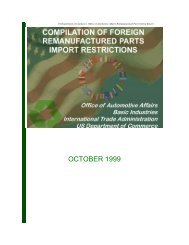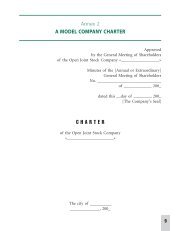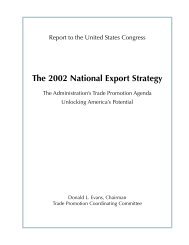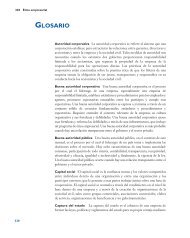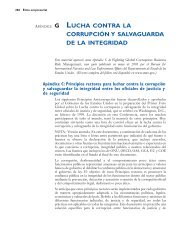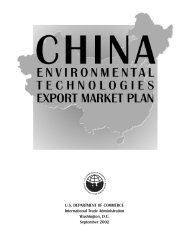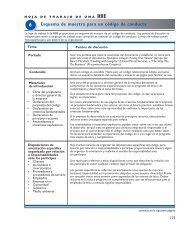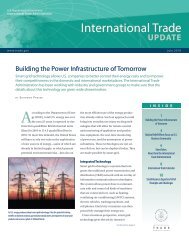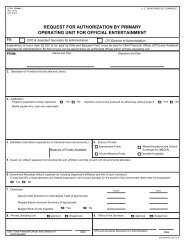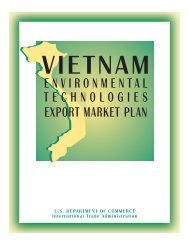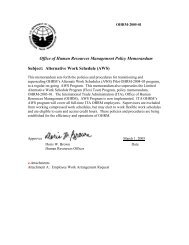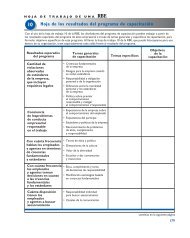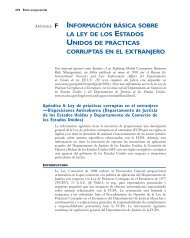Global Steel Trade; Structural Problems and Future Solutions
Global Steel Trade; Structural Problems and Future Solutions
Global Steel Trade; Structural Problems and Future Solutions
Create successful ePaper yourself
Turn your PDF publications into a flip-book with our unique Google optimized e-Paper software.
1.8<br />
Private Sector Response<br />
Industry reaction to the SAIL bailout has been<br />
mixed. Private companies, including TISCO, are<br />
expected to ask for similar treatment.<br />
Others have criticized the government’s bailout of<br />
SAIL. The most vocal has been Indofer, an<br />
association of private steel producers including<br />
Ispat, Lloyds <strong>Steel</strong>, Essar <strong>Steel</strong>, <strong>and</strong> Jindal <strong>Steel</strong>.<br />
According to these companies, “The government<br />
decision to waive steel development fund loans is<br />
highly discriminatory <strong>and</strong> will put the company<br />
[SAIL] above the other major steel producers in<br />
the competitive market for financial resources.”<br />
The government’s intervention may help SAIL<br />
not only maintain production, but increase it as<br />
well. SAIL faces intense domestic competition<br />
<strong>and</strong> needs to deal with mounting inefficiencies.<br />
This bailout largely obviates any motivation for<br />
SAIL to take the painful steps of downsizing<br />
<strong>and</strong> consolidation. As such, the bailout is not<br />
expected to help SAIL get back on its feet in the<br />
long term. 166 For the most part, private sector<br />
companies have generally refrained from harsh<br />
criticism of the bailout. Many of these<br />
companies maintain similarly high debt loads<br />
<strong>and</strong> may, themselves, seek similar kinds of<br />
government assistance. 167 Some industry<br />
groups, however, have been vocal in their<br />
opposition (see box). 168 Import Barriers,<br />
Old <strong>and</strong> New<br />
Metric Tons (millions)<br />
1.7<br />
1.6<br />
1.5<br />
1.4<br />
1.3<br />
1.2<br />
1.1<br />
1<br />
0.9<br />
1991 1992 1993 1994 1995 1996 1997 1998 1999<br />
Source: CMA India.<br />
Total Imports<br />
Minimum import<br />
prices introduced<br />
December 1998<br />
6-14. Indian Imports of <strong>Steel</strong>, All Products<br />
In late 1998, as the threat of<br />
low-priced imports increased,<br />
the government did not shy<br />
away from imposing temporary<br />
import measures to protect the<br />
domestic industry. These<br />
measures, along with existing<br />
import barriers, have<br />
contributed to a decline in<br />
imports of almost 35 percent<br />
from FY 1995 to FY 1999,<br />
bringing imports down below 5<br />
percent of domestic<br />
consumption in FY 1999 169<br />
(Chart 6-14).<br />
Import Floor Prices. The most<br />
notable government intervention was the imposition of a minimum floor price regime for steel imports. At<br />
the urging of the Ministry of <strong>Steel</strong>, the Ministry of Commerce in December 1998 specified floor prices for<br />
import of hot-rolled steel coils, cold-rolled steel coils, hot-rolled sheets, tin-plates, electrical sheets <strong>and</strong><br />
alloy steel bars <strong>and</strong> rods. Imports of hot-rolled steel coils, for example, were allowed only if the minimum<br />
customs value was at least $254 per MT. 170 According to the Joint Plant Committee, “the basic purpose of<br />
[the] imposition of [a] floor price was to safeguard against dumping of steel at low prices due to [the]<br />
surplus scenario in [the] international market.” 171<br />
Minimum prices on steel were withdrawn in January 2000 for primary products (excluding secondary materials<br />
such as scrap). However, domestic producers took the government to court, <strong>and</strong> the Calcutta High Court ruled that<br />
withdrawal of the minimum import prices was “not in the interest of the domestic industry.” Thus, in February,<br />
minimum import prices for primary steel were reinstated. 172 While the Indian government is trying to reverse this<br />
ruling in the Supreme Court, pressure is mounting from domestic industry to leave the measure in place. The U.S.<br />
government is currently reviewing the consistency of this action with India’s obligations under the WTO. 173<br />
168 <strong>Global</strong> <strong>Steel</strong> <strong>Trade</strong>: <strong>Structural</strong> <strong>Problems</strong> <strong>and</strong> <strong>Future</strong> <strong>Solutions</strong>



